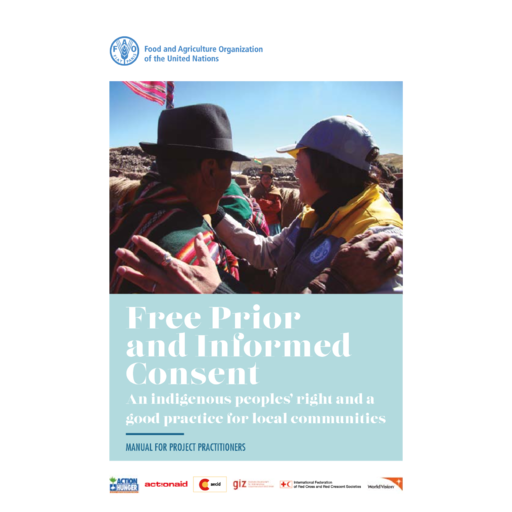Focal point
Location
The Food and Agriculture Organization of the United Nations leads international efforts to defeat hunger. Serving both developed and developing countries, FAO acts as a neutral forum where all nations meet as equals to negotiate agreements and debate policy. FAO is also a source of knowledge and information. We help developing countries and countries in transition modernize and improve agriculture, forestry and fisheries practices and ensure good nutrition for all. Since our founding in 1945, we have focused special attention on developing rural areas, home to 70 percent of the world's poor and hungry people.
Members:
Resources
Displaying 1316 - 1320 of 5073Free Prior and Informed Consent - An indigenous peoples’ right and a good practice for local communities
This manual is designed to assist development organizations to respect the right to FPIC when developing and implementing projects affecting Indigenous Peoples. It contains a six-step procedure to facilitate the FPIC process while showing its benefits, as well as provides the regulatory framework to be used when mainstreaming Indigenous Peoples’ rights within organizations’ policies and standards.
Renforcement de l’efficacité et de la durabilité des investissements hydroagricoles pour lutter contre la pauvreté
La gestion de l’eau par les petits exploitants agricoles (y compris toutes les formes d’irrigation informelle, privée, eau pour l’élevage, pêche etc.) – la GEA à petite échelle- recèle un potentiel de développement important encore largement inexploité. Le projet financé par le FIDA et mis en oeuvre par la FAO et l’IWMI est une opportunité pour comprendre les conditions de succès pour le développement de toutes les formes informelles de gestion de l’eau en agriculture et pour améliorer l’efficacité et les performances des projets de développement.
Report of the first session of the COFI Advisory Working Group on Aquatic Genetic Resources and Technologies, Brasilia, Brazil, 1–2 October 2015
The relevance of the sustainable use, management and conservation of aquatic genetic resources (AqGR) for food and agriculture is relatively well known and documented, but there is still an urgent need to preserve and better manage existing aquatic diversity to enhance its contribution to food security, nutrition and livelihoods. Aquatic genetic resources for food and agriculture include thousands of species, which are found in the world’s oceans, seas, lakes, reservoirs, rivers, rice paddies and other wetlands, and also in aquaculture facilities in marine, brackish and fresh waters.
Home Country Measures that Promote Responsible Foreign Agricultural Investment
This paper summarizes the good practices by nine selected OECD countries that seek to promote responsible foreign investment in developing country agriculture, primarily by investors in their territory or jurisdiction. The study provides examples of the increasing trend of home countries in establishing binding legal norms and other mechanisms as safeguards that are relevant for agricultural investment.
Enhancing Agriculture Monitoring System based on geospatial technology in Afghanistan
The main goal of this project that FAO will propose in Afghanistan is to strengthen national capacity to facilitate monitoring, analysis and interpretation of agriculture and natural resources information combined with information generated from remote sensing for sustainable agricultural land use planning and management.







